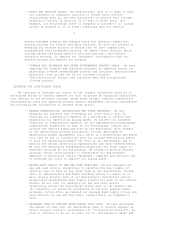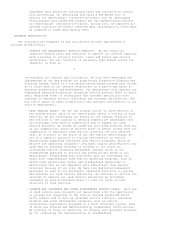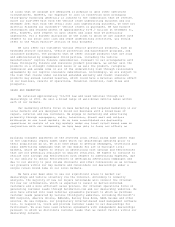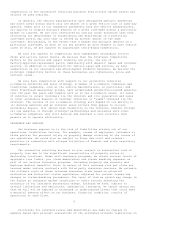AutoNation 2001 Annual Report Download - page 14
Download and view the complete annual report
Please find page 14 of the 2001 AutoNation annual report below. You can navigate through the pages in the report by either clicking on the pages listed below, or by using the keyword search tool below to find specific information within the annual report.Slate, Meagher & Flom from 1991 until 1996.
ALLAN D. STEJSKAL has served as our Senior Vice President of Operations
since September 2001. Since joining our company in September 2000, Mr. Stejskal
served in various capacities prior to his appointment as Senior Vice President
of Operations, including as Senior Vice President, e-Commerce, and Senior Vice
President, Chief Information Officer. From 1995 until joining AutoNation, Mr.
Stejskal held various positions at Automatic Data Processing, Inc., a leading
national provider of computerized transaction processing, data communication and
information services, most recently as Vice President, Dealer Services Division,
a position he held since February 1998.
10
RISK FACTORS; FORWARD-LOOKING STATEMENTS MAY PROVE INACCURATE
Our business, financial condition, results of operations, cash flows and
prospects, and the prevailing market price and performance of our common stock,
may be adversely affected by a number of factors, including the matters
discussed below. Certain statements and information set forth in this Annual
Report on Form 10-K, as well as other written or oral statements made from time
to time by us or by our authorized executive officers on our behalf, constitute
"forward-looking statements" within the meaning of the Federal Private
Securities Litigation Reform Act of 1995. We intend for our forward-looking
statements to be covered by the safe harbor provisions for forward-looking
statements contained in the Private Securities Litigation Reform Act of 1995,
and we set forth this statement and these risk factors in order to comply with
such safe harbor provisions. You should note that our forward-looking statements
speak only as of the date of this Annual Report on Form 10-K or when made and we
undertake no duty or obligation to update or revise our forward-looking
statements, whether as a result of new information, future events or otherwise.
Although we believe that the expectations, plans, intentions and projections
reflected in our forward-looking statements are reasonable, such statements are
subject to known and unknown risks, uncertainties and other factors that may
cause our actual results, performance or achievements to be materially different
from any future results, performance or achievements expressed or implied by the
forward-looking statements. The risks, uncertainties and other factors that our
stockholders and prospective investors should consider include, but are not
limited to, the following:
THE AUTOMOTIVE RETAILING INDUSTRY IS CYCLICAL AND IS SENSITIVE TO CHANGING
ECONOMIC CONDITIONS AND MANUFACTURER INCENTIVE PROGRAMS; WE EXPECT RETAIL SALES
OF NEW VEHICLES IN THE UNITED STATES DURING 2002 TO DECREASE BY AN ESTIMATED
FIVE TO TEN PERCENT COMPARED TO 2001 ON A UNIT BASIS, ALTHOUGH SALES LEVELS ARE
VERY DIFFICULT TO PREDICT; LOWER ACTUAL SALES LEVELS COULD MATERIALLY ADVERSELY
IMPACT OUR BUSINESS.
Sales of motor vehicles, particularly new vehicles, historically have been
subject to substantial cyclical variation characterized by periods of oversupply
and weak demand. We believe that many factors affect the industry, including
consumer confidence in the economy, the level of personal discretionary
spending, interest rates, fuel prices, credit availability, unemployment rates,
the level of manufacturer incentives and the number of consumers whose vehicle
leases are expiring. New vehicle sales rates during 2001 varied significantly
during the year. Following the September 2001 terrorist attacks in the United
States, the industry experienced a dramatic but brief decline in sales of new
vehicles that was followed by sales of new vehicles at a near-record pace during
the remainder of 2001, driven primarily by increased manufacturer incentives,
such as the 0% financing offers during the fourth quarter of 2001. We expect
retail sales of new vehicles in the United States during 2002 to decrease by an
estimated five to ten percent compared to 2001 on a unit basis. However, the
level of retail sales of new vehicles during 2002 is very difficult to predict,
as evidenced by automotive manufacturers and various industry experts predicting
a wide range of sales level decreases during 2002 as compared to 2001, and is
likely to be impacted by vehicle manufacturers' willingness to continue
significant incentive programs, as well as other factors noted above. A
significant change in new vehicle sales levels in the United States during 2002
























